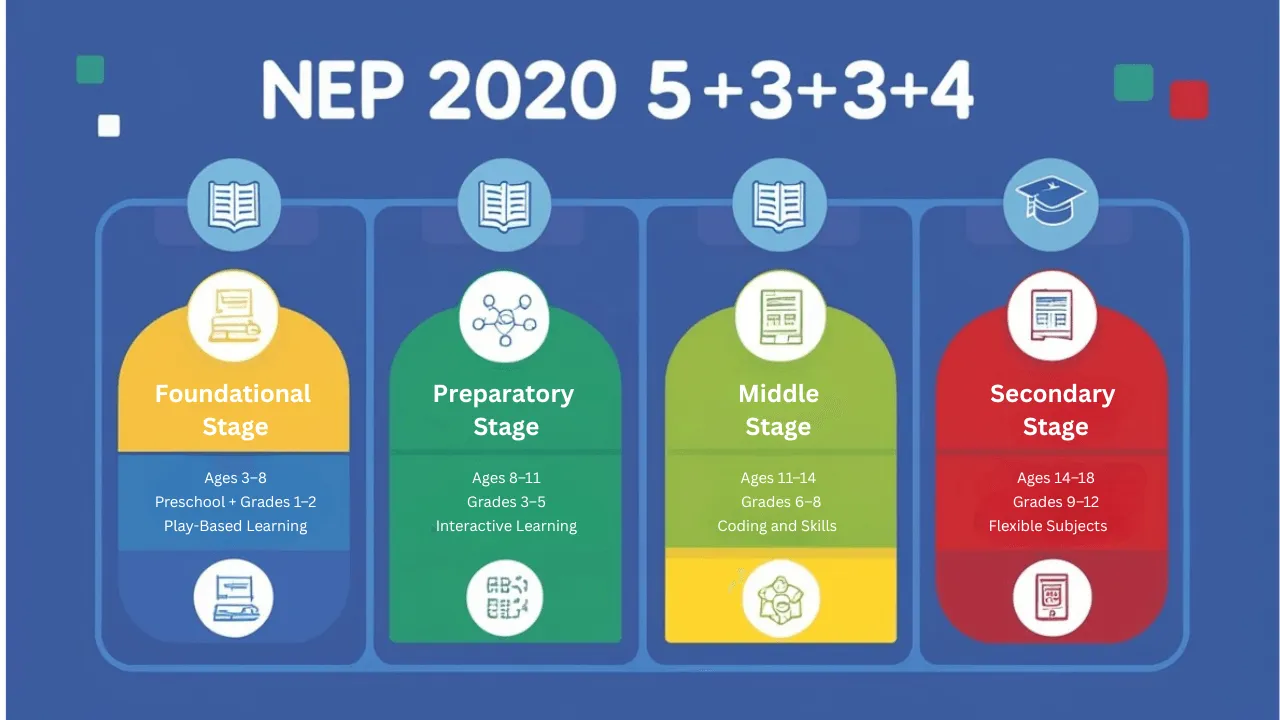Table of Contents
NEP 2020 for schools is not just a policy in a PDF — it is a roadmap that forces schools to rethink teaching, operations, staffing, and technology. Many school leaders still treat NEP 2020 for schools as optional guidance. That is the problem. The pain point is clear: continuing old practices risks poor student outcomes, regulatory non-compliance, and missed funding or partnership opportunities. The solution is practical: align curriculum, assessment, teacher development, and digital systems to the 5+3+3+4 curriculum and foundational literacy and numeracy goals. In short, NEP 2020 for schools demands operational change — and this post shows exactly how to act.
How NEP 2020 for Schools Reshapes Operations
Classroom and Curriculum Changes
NEP 2020 for schools restructures learning stages, assessment, and pedagogy. The 5+3+3+4 curriculum replaces the rigid 10+2 model. This affects timetables, teacher deployment, infrastructure, and classroom practice.
Key Implications
- Curriculum redesign across grades requires new lesson plans and outcomes.
- Multi-age and activity-based learning mean flexible timetables and spaces.
- New assessment approaches shift focus from rote exams to competency checks.
- Early childhood education (ages 3–6) must be integrated into school operations.
5+3+3+4 Curriculum in Practice
| Old Model | NEP 2020 Model | Operational Change |
|---|---|---|
| 10+2, exam-driven | 5+3+3+4, developmentally aligned | Revise curriculum maps |
| Rote memorization | Activity-based, experiential | Invest in teacher training |
| Late focus on basics | Early literacy and numeracy | Add ECCE programs |
Understanding the 5+3+3+4 Curriculum
The 5+3+3+4 structure introduced by NEP 2020 for schools replaces the traditional 10+2 model and is aligned with stages of child development.
Foundational Stage (5 years)
- Grades: Preschool/Anganwadi (3 years) + Grades 1–2
- Ages: 3–8 years
- Focus: Play-based, activity-driven learning with strong emphasis on foundational literacy and numeracy.
Preparatory Stage (3 years)
- Grades: 3–5
- Ages: 8–11 years
- Focus: Transition to formal learning with engaging, interactive methods. Subjects like science, maths, arts, and language introduced in a fun, activity-oriented manner.
Middle Stage (3 years)
- Grades: 6–8
- Ages: 11–14 years
- Focus: Subject-specific teaching, critical thinking, coding, and vocational skills. More analytical and project-based learning included.
Secondary Stage (4 years)
- Grades: 9–12
- Ages: 14–18 years
- Focus: Flexible subject choices, multidisciplinary learning, critical thinking, internships, and research. Board exams redesigned to assess applied knowledge.
Summary Table
| Stage | Grades | Ages | Focus Area |
| Foundational | Preschool – Grade 2 | 3–8 yrs | Play-based, literacy & numeracy |
| Preparatory | Grades 3–5 | 8–11 yrs | Interactive classroom learning |
| Middle | Grades 6–8 | 11–14 yrs | Subject depth, coding, skills |
| Secondary | Grades 9–12 | 14–18 yrs | Flexible subjects, critical thinking |
Operational Areas Schools Must Change
Curriculum and Assessment
- Implement formative assessments and quick feedback loops.
- Reduce high-stakes tests with project-based evaluations.
- Maintain student portfolios for holistic progress.
Teacher Development
- Provide continuous professional development.
- Redefine teacher roles as facilitators and mentors.
- Train teachers in digital resource integration.
Early Childhood Integration
- Adopt play-based learning for ages 3–6.
- Train ECCE specialists or partner with professionals.
- Reconfigure classrooms for activity-based learning.
Infrastructure and Timetabling
- Create multipurpose spaces, digital labs, ECCE rooms.
- Introduce project weeks, internships, and flexible timetables.
Role of Education Technology in NEP 2020 for Schools
NEP 2020 for schools highlights technology as a driver of change.
Minimum Digital Capabilities Required
- Student information system
- Digital attendance and assessment tracker
- Parent communication portal
- ECCE and remedial learning content
- Teacher training platforms

Roadmap for NEP 2020 Implementation
Step 1: Leadership and Gap Audit (Months 0–2)
- Conduct NEP readiness audit.
- Identify teacher and technology gaps.
Step 2: Pilot Programs (Months 3–6)
- Start formative assessment pilots.
- Launch teacher upskilling initiatives.
- Deploy basic student information system.
Step 3: Scale and Integration (Months 7–9)
- Expand pilots across more grades.
- Create project weeks and launch ECCE rooms.
Step 4: Review and Partnerships (Months 10–12)
- Collect feedback from parents, teachers, and students.
- Apply for NEP-linked funding and EdTech partnerships.
Measuring Success
- Student achievement in foundational literacy and numeracy.
- Teacher PD hours and classroom observation ratings.
- Reduced dropout rates and smoother transitions across grades.
FAQs
How quickly must schools implement NEP 2020 for schools?
Implementation varies by state, but early alignment on ECCE, assessments, and teacher training should start now.
Does NEP 2020 for schools require expensive technology?
No. Schools can begin with scalable, low-cost platforms and expand gradually.
How does NEP 2020 for schools change assessments?
It introduces continuous, competency-based evaluations, portfolios, and project-based learning.
How should schools integrate ECCE?
By redesigning early years curriculum, training ECCE teachers, and creating safe, activity-based classrooms.
Will NEP 2020 for schools affect accreditation?
Yes, boards will adapt. Proactive alignment improves compliance and reputation.
Conclusion
NEP 2020 for schools is a transformational mandate. It changes not only what students learn but also how schools operate. From curriculum and teacher training to technology integration, operational change is no longer optional. Schools that embrace NEP 2020 for schools now will build stronger systems, improve outcomes, and stay ahead of compliance requirements.
Call-to-Action
Is your school ready for NEP 2020 for schools? Legacy EdTech can help audit gaps, implement teacher training, and deploy digital solutions tailored to NEP needs. Contact us today to start your transformation.







